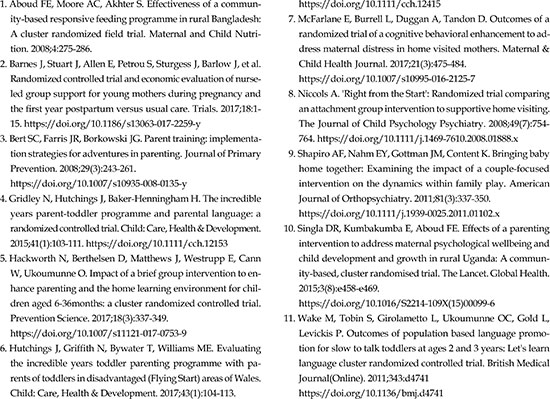1. Barlow J, Smailagic N, Ferriter M, Bennett C, Jones H. Groupbased parent-training programmes for improving emotional and behavioral adjustment in children from birth to three years old. Cochrane Database of Systematic Reviews. 2010; (3):CD003680. DOI:
10.1002/14651858.CD003680.pub2.

2. Nolan ML, Mason V, Snow S, Messenger W, Catling J, Upton P. Making friends at antenatal classes: A qualitative exploration of friendship across the transition to motherhood. The Journal of Perinatal Education. 2012; 21(3):178–185. DOI:
10.1891/1058-1243.21.3.178.

3. Nyström K, Öhrling K. Parenthood experiences during the child's first year: Literature review. Journal of advanced nursing. 2004; 46(3):319–330. DOI:
10.1111/j.1365-2648.2004.02991.x.
4. Antonia M, Nelson RNC. Transition to motherhood. Journal of Obstetric, Gynecologic, & Neonatal Nursing. 2003; 32(4):465–477. DOI:
10.1177/0884217503255199.
5. Lefèvre Å, Lundqvist P, Drevenhorn E, Hallström I. Parents experiences of parental groups in Swedish child health-care: Do they get what they want? Journal of Child Health Care. 2016; 20(1):46–54. DOI:
10.1177/1367493514544344.
6. Guest EM, Keatinge D. The value of new parent groups in child and family health nursing. The Journal of Perinatal Education. 2009; 18(3):12–22. DOI:
10.1624/105812409X461180.

7. Hanna BA, Edgecombe G, Jackson CA, Newman S. The importance of first-time parent groups for new parents. Nursing & Health Sciences. 2002; 4(4):209–214. DOI:
10.1046/j.1442-2018.2002.00128.x.

8. Kruske S, Schmied V, Sutton I, O'hare J. Mothers' experiences of facilitated peer support groups and individual child health nursing support: A comparative evaluation. The Journal of Perinatal Education. 2004; 13(3):31–38.

9. Lefèvre Å, Lundqvist P, Drevenhorn E, Hallström I. “From resistance to challenge”: Child health service nurses experiences of how a course in group leadership affected their management of parental groups. BMC Nursing. 2017; 16:73.

10. Darbyshire P, Jackson D. Epilogue: Using a strengths approach to understand resilience and build health capacity in families. Contemporary Nurse. 2005; 18(1-2):211–212. DOI:
10.5172/conu.18.1-2.211.
11. Olds DL, Robinson J, O'Brien R, Luckey DW, Pettitt LM, Henderson CR, et al. Home visiting by paraprofessionals and by nurses: A randomized, controlled trial. Pediatrics. 2002; 110(3):486–496. DOI:
10.1542/peds.110.3.486.

12. Lefèvre Å, Lundqvist P, Drevenhorn E, Hallström I. Managing parental groups: Personal impact of a group leadership course for child healthcare nurses. Journal of Clinical Nursing. 2017; 26(3-4):466–476. DOI:
10.1111/jocn.13446.

13. Gardner MR, Deatrick JA. Understanding interventions and outcomes in mothers of infants. Issues in Comprehensive Pediatric Nursing. 2006; 29(1):25–44. DOI:
10.1080/01460860500523756.

14. Fielden JM, Gallagher LM. Building social capital in first-time parents through a group-parenting program: A questionnaire survey. International Journal of Nursing Studies. 2008; 45(3):406–417. DOI:
10.1016/j.ijnurstu.2006.09.008.

15. Strange C, Fisher C, Howat P, Wood L. Fostering supportive community connections through mothers' groups and playgroups. Journal of Advanced Nursing. 2014; 70(12):2835–2846. DOI:
10.1111/jan.12435.

16. Barlow J, Coren E, Stewart-Brown S. Meta-analysis of the effectiveness of parenting programmes in improving maternal psychosocial health. British Journal of General Practice. 2002; 52(476):223–233.
17. Song JE, Ahn JA. Effect of intervention programs for improving maternal adaptation in Korea: Systematic review. Korean Journal of Women Health Nursing. 2013; 19(3):129–141. DOI:
10.4069/kjwhn.2013.19.3.129.

18. Lee JY, No SH. Effects of breast feeding interventions program on breastfeeding for premature babies: A systematic review and meta-analysis. Korean Parent-Child Health Journal. 2018; 21(1):50–60.
19. Kang J, Seomun GA. A Systematic review and meta-analysis of the effect on newborn care education program. Journal of Digital Convergence. 2017; 15(3):247–257. DOI:
10.14400/JDC.2017.15.3.247.

20. Khang YH, Cho SH, June KJ, Lee JY, Kim YM, Cho HJ. The Seoul healthy first step project: Introduction and expansion, program content and performance, and future challenges. Journal of the Korean Society of Maternal and Child Health. 2018; 22(2):63–76. DOI:
10.21896/jksmch.2018.22.2.63.
21. Park JE, Seo HJ, Seo HS, Son HJ, Shin CM, Lee YJ, et al. NECA's guidance for undertaking systematic reviews and meta-analyses for intervention. National Evidence-based Healthcare Collaborating Agency;2011. 8:p. 1–287.
22. Cohen J. Statistical power analysis. Current Directions in Psychological Science. 1992; 1(3):98–101.

23. Kendall S, Bloomfield L, Appleton J, Kitaoka K. Efficacy of group-based parenting program on stress and self-efficacy among Japanese mothers: A quasi-experimental study. Nursing and Health Sciences. 2013; 15:454–460. DOI:
10.1111/nhs.12054.
24. Shorey S, Chan SWC, Chong YS, He HG. A randomized controlled trial of the effectiveness of a postnatal psychoeducation programme on self efficacy, social support and postnatal depression among primiparas. Journal of Advanced Nursing. 2015; 71(6):1260–1273. DOI:
10.1111/jan.12590.
25. Lee KH. Effects of childhood parenting environment on children's personality. Report of Children's Welfare Institute;2015. 1:p. 1–44.
26. Kendrick D, Elkan R, Hewitt M, Dewey M, Blair M, Robinson J, et al. Does home visiting improve parenting and the quality of the home environment? A systematic review and meta analysis. Archives of Disease in Childhood. 2000; 82(6):443–451.

27. Kim JK, Suh JH, Bae HB. The longitudinal effects of mother's antenatal/postpartum depression and parenting stress on the infant development. Journal of Early Childhood Education & Educare Welfare. 2016; 20(4):591–611.
28. Kwon HJ, Kim KH, Choi MH, Cho JY, Ahn YM, Kim KS. Effects of postpartum depression and temperament of infant on childcare stress among mothers of newborn infants. Journal of Korean Academy of Child Health Nursing. 2011; 17(2):69–73. DOI:
10.4094/jkachn.2011.17.2.69.

29. Nicole L, Duffett-Leger L, Stewart M, Hegadoren K, Dennis CL, Rinaldi CM, et al. Canadian mothers' perceived support needs during postpartum depression. Journal of Obstetric, Gynecologic, & Neonatal Nursing. 2007; 36(5):441–449. DOI:
10.1111/J.1552-6909.2007.00174.x.

30. OH KS. Social support as a prescription theory. Journal of Nursing Query. 2006; 15(1):134–154.




